Miss Mary Blandy continued to introduce the ‘love
philtre’ into her father’s food during the summer of 1751. Her lover,
Cranstoun, wrote a letter to her,
“I am sorry there are such occasions to clean your pebbles. You must make use of the powder to them, by putting it into anything of substance, wherein it will not swim a-top of the water, of which I wrote to you in one of my last. I am afraid it will be too weak to take off their rust, or at least it will take too long a time.”
Mary read between
the lines. She had been putting the powder into her father’s tea but it seems
that it had floated and the old man had been put off from drinking it. That is
why the tea had been left undrunk and why the servants had taken it instead,
although no suspicion arose when they became ill after consuming it.
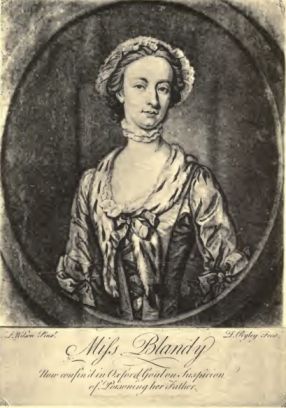 |
| Miss Mary Blandy |
So, Mary
changed her method – ‘anything of substance’, Cranstoun had said, so she
turned instead to her father’s oatmeal, stirring the powder into his water
gruel. The servants noticed a white residue in the bottom of the gruel pan and
hid the pan away, unwashed. Mr Blandy came into the kitchen one morning, to get
hot water for his shave, and he dropped hints to his daughter that he suspected
a friend of his had been poisoned in the coffee house. His tea, he said, had a bad
taste and he suspected there was something untoward with it.
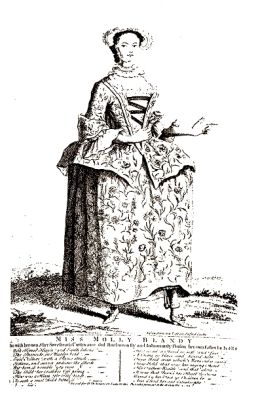 |
| Miss Molly [sic] Blandy |
Alarmed, Mary went
to her room, took Cranstoun’s letters and the packet containing the powder and
threw them onto the fire. Susan Gunnel, the maid, noticed what was going on and
threw heavy coals onto the fire and when her mistress went out of the room, she
recovered what remained unburned from the hearth, including the packet of
powder. Miss Blandy, in a show of concern, sent for the famous Dr Addington,
who arrived and with typical directness told her that her father was being
poisoned. She denied it, of course, but dashed off a note to Cranstoun,
“DEAR WILLY, My father is so bad that I have only time to tell you that if you do not hear from me soon again, don't be frightened. I am better myself. Lest any accident should happen to your letters be careful what you write. My sincere compliments, I am ever, yours.”
The clerk who was charged with posting this
note handed it over at once to the doctor. The servants produced the gruel pan
and the packet of powder, and Mr Benjamin Norton, an apothecary, confirmed that
love philtre was really white arsenic. Dr Addington pulled no punches. He told
Mary outright,
“If your father dies, you will inevitably be ruined.”
Norton ordered Mary from her father’s bedside and placed Gunnel on watch, with
strict orders to admit no one. Nevertheless, old Mr Blandy asked for his
daughter and when she came, he told her that he suspected Cranstoun of the
whole sorry business and she could not be to blame. In tears, she begged
forgiveness, and the old man replied,
“I bless thee, and hope that God will bless thee and amend thy life. Go, my dear, go out of my room. Say no more, lest thou shouldst say anything to thy own prejudice.”
Dr Addington asked
Mr Blandy directly whom he thought was to blame for his poisoning,
“A poor love-sick girl, I forgive her. I always thought there was mischief in those cursed Scotch pebbles.”
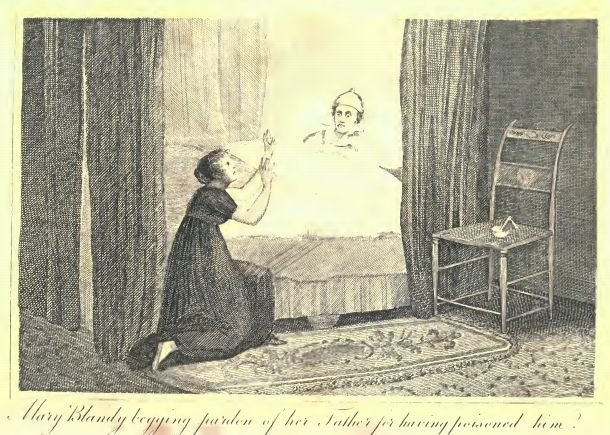 |
| Miss Blandy begs her Father's Pardon |
It was enough for the shrewd old doctor who took
the law into his own hands and had Mary Blandy put under lock and key in her
own room, with a guard on the door. Sadly, nothing could be done for the old
lawyer and on August 14th, Mr Francis Blandy died in his bed. It
just so happened that the guard placed on Miss Blandy’s door, Mr Herne, had
worked as a humble clerk for her father some years before and who had once had
his aspirations for the hand of the attorney’s daughter politely rejected by
the ladder-climbing lawyer.
Mr Herne abandoned his sentry duty, to go and dig a
grave for his former employer, he said, which convenience gave Miss Blandy the
opportunity to escape into the street and over Henley Bridge. Dressed only in a
half-sack and a petticoat without hoops, she was immediately recognised by her
neighbours and forced to take refuge from the assembling mob in the Angel
tavern. Mr Alderman Fisher, called as a juryman for the inquest and
post-mortem, brought a closed carriage (‘to preserve her from the resentment
of the populace’) to the Angel and persuaded the fugitive to return to her
home with him.
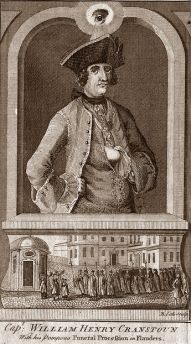 |
| Capt. William Henry Cranstoun |
Later in the day, Dr Addington, assisted by other medical men,
performed the autopsy, and the inquiry concluded that Francis Blandy had been
poisoned and murdered by his daughter, who had administered arsenic to him
concealed in his food and drink. The mayor and coroner issued the constables
with a warrant to detain the prisoner and convey her to Oxford prison to await
the due process of law.
That evening, Mr Francis Blandy was buried, in the
presence of Norton, the apothecary, Littleton, his clerk, and Harman, his
footman; none of his relatives attended. Miss Blandy was given leave to pack
her essentials, including her caddy of fine Hyson tea, and a former servant,
Mrs Dean, was engaged to act as her maid. At four o’clock in the Saturday morning, a landau and four containing the
two ladies and two constables left Henley for Oxford Castle, arriving there at
about eleven.
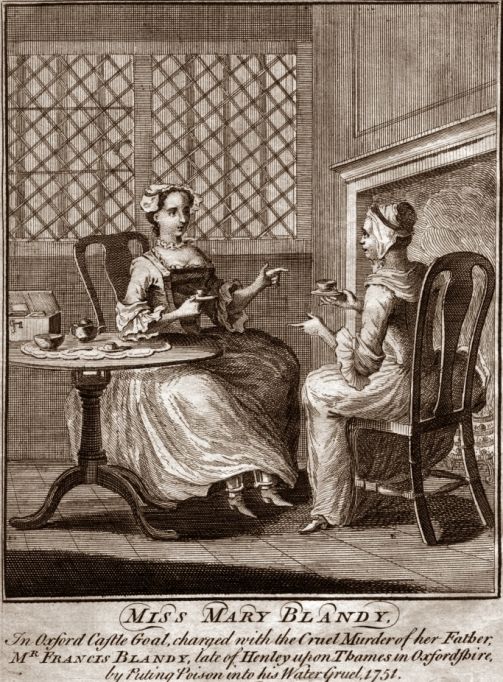 |
| Miss Mary Blandy takes tea at Oxford Castle |
Miss Blandy was given the finest apartments in the keeper’s
house, where she took tea twice a day, walked in the castle garden’s in the
afternoon and played cards in the evening. Her privacy was respected, and
although great sums of money were offered, no one was allowed to see her
without her permission. In genteel seclusion, she waited for the date of her
trial to be set.
No comments:
Post a Comment